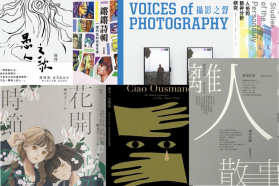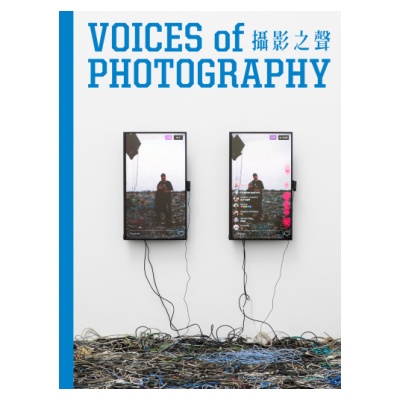
VOP Issue 31:技術邏輯 Technologic
Publisher:
Publishing Date:
Format :
Category:
Price:
書籍介紹
「誰控制了過去,就控制了未來;誰控制了現在,就控制了過去。」伴隨技術開發主義的狂熱,跟隨喬治.歐威爾在《1984》著名論題之後的,是否「誰控制了技術,就控制了現在」?
本期特寫三位藝術家──陸明龍電玩動畫般的電腦合成影片描繪了後人類自動化世界的圖景,具備感知與創造力的AI、遊戲化的擬像空間,呈現著現在進行式的科幻轟炸與歷史狂想;結合程式、訊號與電子裝置,鄭先喻採集人類行為、情感和機器的關聯,揭示當前受技術環繞包覆的存在狀態;雙人藝術組合exonemo挑釁人們對數位介面與技術圖像的依戀,拾取我們已失去實際主權的滑鼠、螢幕、網速、運算、觸控及遠端社交⋯⋯。
在本期專文中,隨著混合實境與元宇宙/魅他域(metaverse)逼臨之際,陳蕉試想我們終將難以擺脫的數位化身與活動足印,逐漸成為一個全時自我檢查、自我監控的「魅他人」(metahuman);陳琬尹論析自動化技術與治理之間密切卻隱微的連動,並從區域科技發展的不同進程所造成的技術誤差,想像技術的可能重塑;胡子哥(Gabriele de Seta)對中國近年的「換臉」深偽應用與文化效應進行考察,探究由網媒企業主導以及網民自製迷因所生產的各種視覺合成技術,所衍生出關於創意、隱私、監管以及對真實的複雜挑戰;閻望雲從近期的國際媒體藝術節中,綜覽探討數據、演算法、人工智慧、感應與辨識技術的複合影像和時基媒體藝術的全球實踐。
本期亦收錄哲學家許煜及韓炳哲的專訪,分享他們在全球技術集中化下的社會觀察。許煜認為此時正是反轉問題的時機──不是去問技術會如何改造藝術,而是去問藝術如何可以改造技術,他呼籲建立技術多樣性(technodiversity),藉由轉變藝術、技術與思維間的固有連結,尋求超越現實政治及應對當代技術發展的方案;而韓炳哲指出,作為「數據性戀者」(datasexual)的人們正進入一個失去實物與實物感知的「非物」世界,在數位舒適區無限供給的快速資訊與娛樂成癮中,任由數位資本主義剝削人的本能欲望,正如赫胥黎在《美麗新世界》所預見的──人的愉悅受到管理所宰制,韓炳哲警示這即是我們的未來。
此外,在本期中,李立鈞回顧攝影的「失敗史」,從X光攝影在發現初期被認為是拍壞的照片,到斑點、刮痕與殘影等「缺陷」顯露的化學顯影軌跡,提示攝影的物質性所隱含有待推究的影像創見與訊息。陳傳揚檢視法國攝影師奧古斯特.薩爾茲曼在十九世紀中葉的耶路撒冷考古攝影,論證科學紀錄與藝術創作之間的拉力關係。史惟筑回顧二十世紀二〇至三〇年代日治時期台人的電影經驗,追溯台灣初代「影戲狂」的光影摩登想望。李威儀探尋1963年發生在台中公園的一場美國太空飛行視聽事件,如何在冷戰年代幽微影響台灣軍事與文化的在地歷史感知建構,並與美利堅的成就遠端共感。
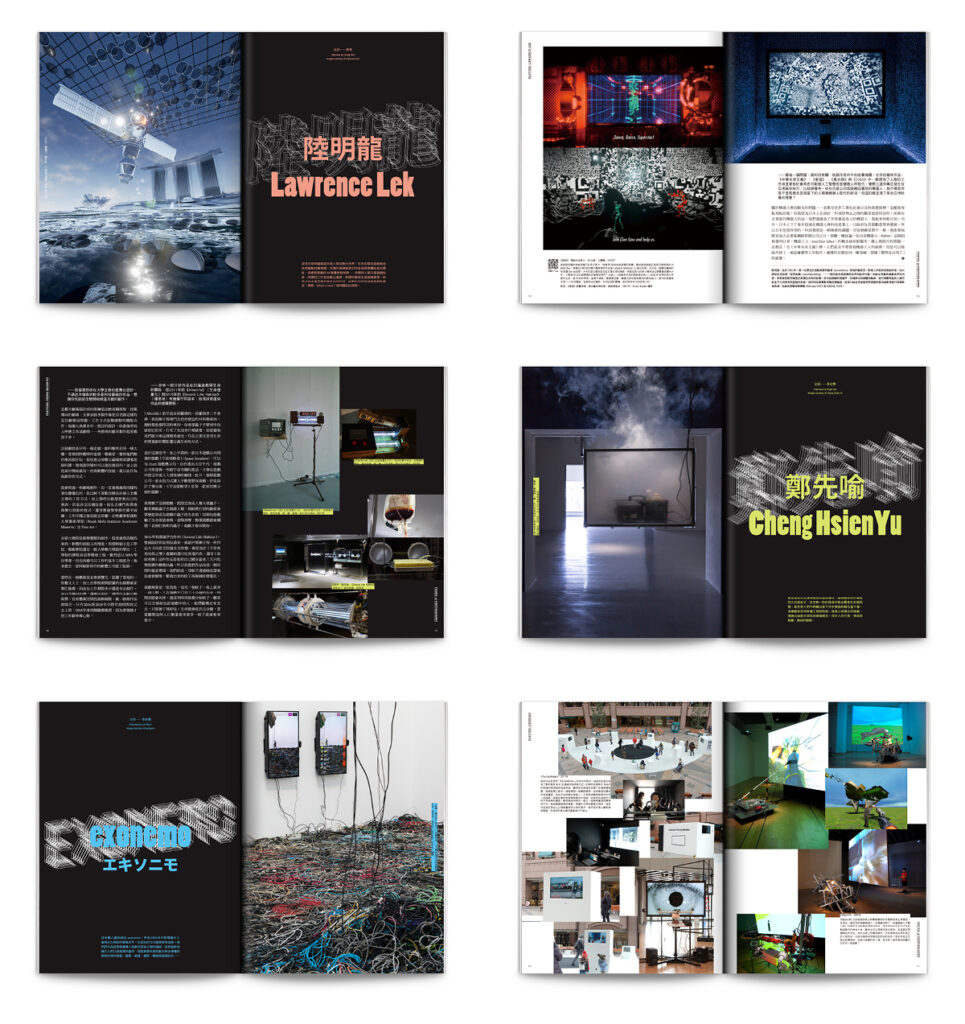
“Who controls the past controls the future. Who controls the present controls the past.” With the current frenzy around technological developments, is it the case now, following George Orwell’s saying from 1984, that “who controls the technology controls the present?”
In this issue, we are featuring three artists: Lawrence Lek depicts a post-human automated world built around artificial intelligence with the capacity of perception and creativity using computer-generated videos resembling computer games. The gamified simulations present an ongoing rhapsody of history and bombardment by modern science fiction. Cheng Hsien-Yu uses a combination of programming, signals and electronics to decipher the relationship between human behavior, emotions and machines, thereby revealing the present situation where we are surrounded by technology. Artistic duo exonemo tries to challenge our attachment to digital interfaces and technical images, picking up the mouses, screens, connection speed, computing, touch and remote socializing that we have long lost actual control of…
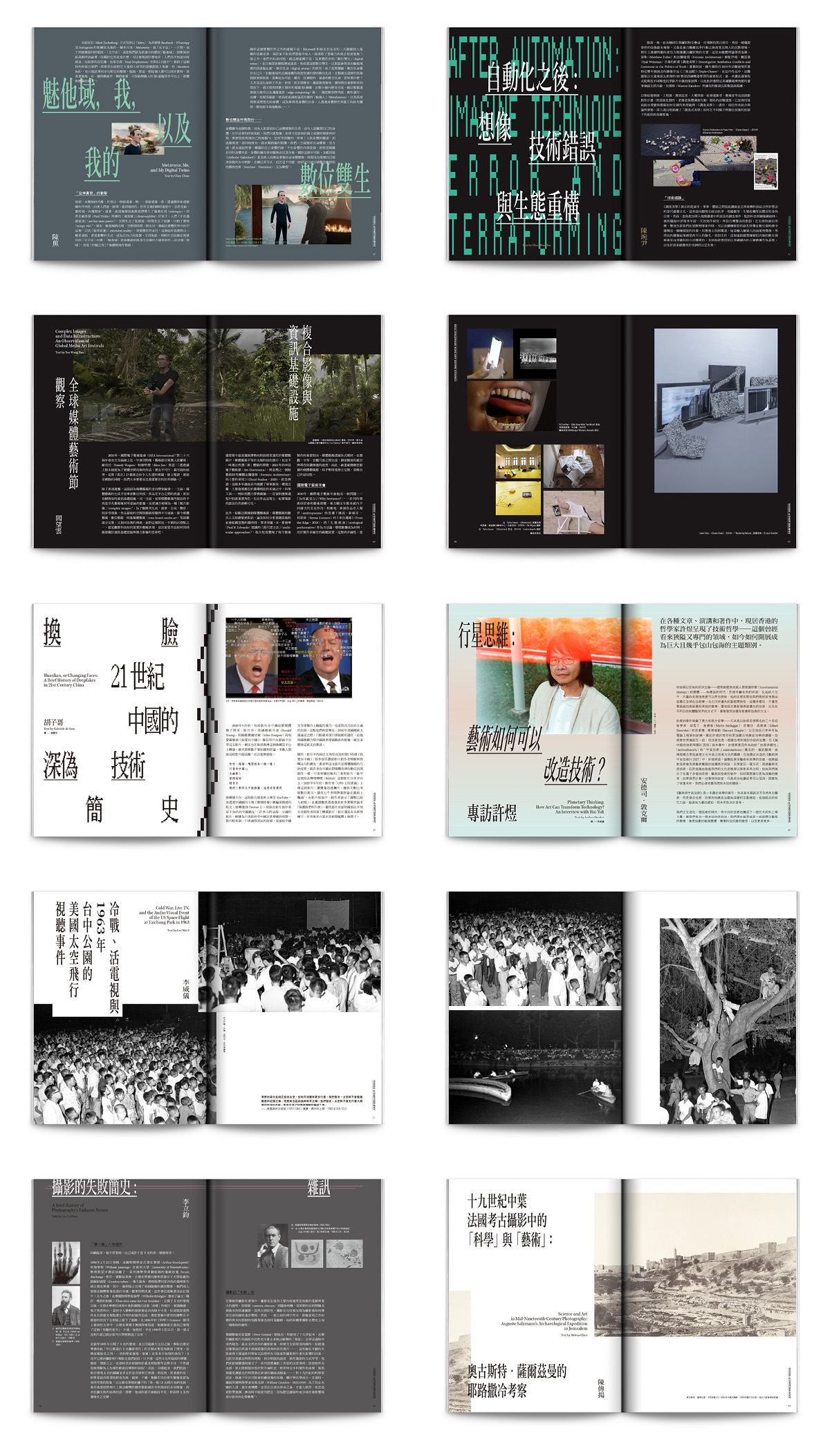
This issue includes essays by Chen Chiao, who proposes the theory that we would eventually become unable to break away from our digital incarnations and footprints in this age of mixed reality and metaverse, and slowly turn into “metahumans” who are constantly examining and monitoring ourselves. Chen Wan-Yin analyzes the close but subtle ties between automation technology and governance, and tries to imagine the possible reshaping of technology through the technique errors caused by the different processes in technological development. Gabriele de Seta has been exploring the deepfake application and cultural effects of the “Huanlian” (Changing Faces) technology, and examines the complex challenges it poses on creativity, privacy, regulation and reality born out of various visual synthetization technology led by online media companies and memes created by Internet users. Yen Wang-Yun looks into the global practice of complex images and time-based media art that explores the areas of data, algorithms, artificial intelligence, perception and recognition technology through the recent global media art festivals.
This issue also covers interviews with philosophers Hui Yuk and Han Byung-Chul as they share their observations on the societal changes under global centralization of technology. Hui Yuk believes that the time is ripe to reverse the question: not to ask how technology may transform the concept of art, but how art can transform technology. He calls for technodiversity, where the solution transcends realpolitik and contemporary technological developments through a transformation of the existing relationship between art, technology, and thinking. On the other hand, Han points out that humans, as datasexuals, are entering a world of “non-things”, devoid of objects and perception of objects, and becoming addicted to fast information and entertainment provided limitlessly in a digital comfort zone. Han warns that our future will be one where our basic desires are exploited by digital capitalism and our pleasures dominated and managed, just like what Aldous Huxley foresaw in Brave New World.
In addition, Lee Li-Chun recounts the history of photography’s failures. Beginning from the first x-ray photographs that were considered spoiled, to the “defects” such as spots, scratches and shadows on chemically developed photographs, he shows how the materiality of photography hides within it creative ideas and messages that are waiting to be studied. Helena Chen examines French photographer Auguste Salzmann’s archaeological expedition in Jerusalem and demonstrates the tense relationship between scientific documentation and artistic creation. Shih Wei-Chu recaps the Taiwanese experience with films during the Japanese occupation between 1920s and 1930s and traces the modernistic aspirations of Taiwan’s first generation of “kinema fans”. Lee Wei-I looks back at how the local historical perception of Taiwan’s military and culture, and the remote empathy of the United States’ achievement was ever so slightly influenced by the audio-visual event of the US space flight at the Taichung Park in 1963.
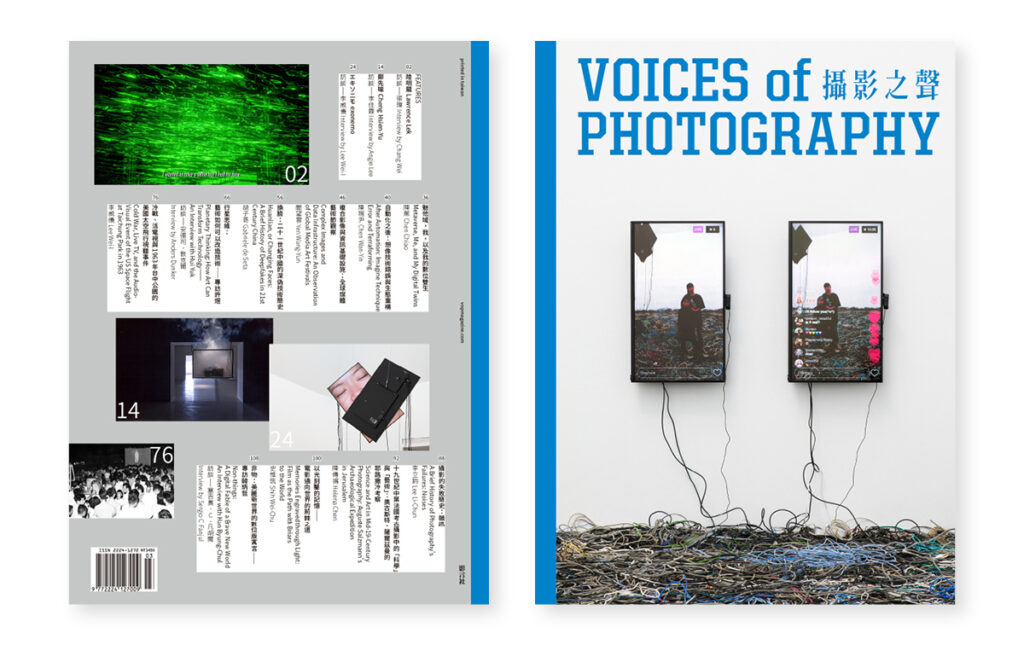
本期目錄 Contents
陸明龍
Lawrence Lek
訪談─張瑋 Interview by Chang Wei
鄭先喻
Cheng Hsien-Yu
訪談─李佳霖 Interview by Angie Lee
エキソニモ
exonemo
訪談─李威儀 Interview by Lee Wei-I
魅他域,我,以及我的數位雙生
Metaverse, Me, and My Digital Twins
陳蕉 Chen Chiao
自動化之後:想像技術錯誤與生態重構
After Automation: Imagine Technique Error and Terraforming
陳琬尹 Chen Wan-Yin
複合影像與資訊基礎設施:全球媒體藝術節觀察
Complex Images and Data Infrastructure:
An Observation of Global Media Art Festivals
閻望雲 Yen Wang-Yun
換臉:二十一世紀中國的深偽技術簡史
Huanlian, or Changing Faces:
A Brief History of Deepfakes in 21st Century China
胡子哥 Gabriele de Seta
行星思維:藝術如何可以改造技術──專訪許煜
Planetary Thinking: How Art Can Transform Technology
An Interview with Hui Yuk
訪談─安德司.敦克爾 Interview by Anders Dunker
冷戰、活電視與1963年台中公園的美國太空飛行視聽事件
Cold War, Live TV, and the Audio-Visual Event of the US Space Flight at Taichung Park in 1963
李威儀 Wei-I Lee
攝影的失敗簡史:雜訊
A Brief History of Photography’s Failures: Noises
李立鈞 Lee Li-Chun
十九世紀中葉法國考古攝影中的「科學」與「藝術」:
奧古斯特.薩爾茲曼的耶路撒冷考察
Science and Art in Mid-19-Century Photography: Auguste Salzmann’s Archaeological Expedition in Jerusalem
陳傳揚 Helena Chen
以光刻鑿的記憶──電影通向世界的荊棘之道
Memories Engraved through Light: Film as the Path with Briars to the World
史惟筑 Shih Wei-Chu
非物:美麗新世界的數位版寓言──專訪韓炳哲
Non-things: A Digital Fable of A Brave New World
An Interview with Han Byung-Chul
訪談──塞吉奧.C.凡胡爾 Interview by Sergio C. Fanjul

